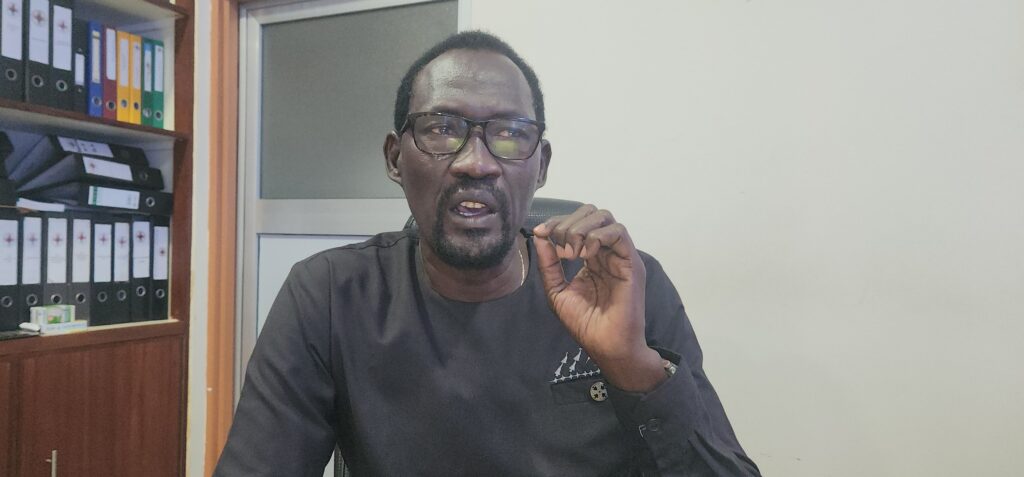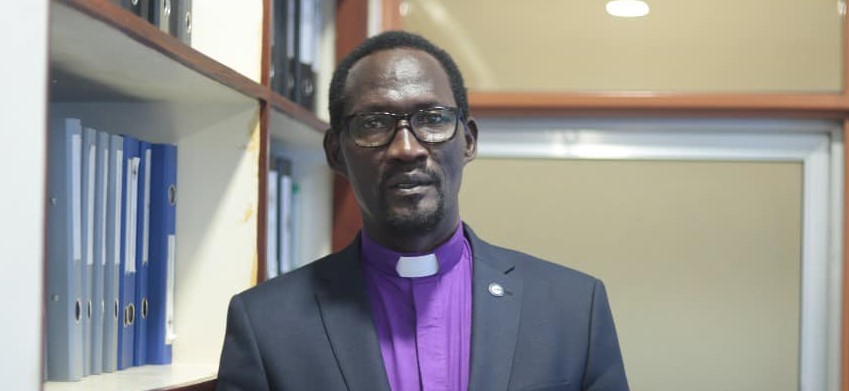As suspended First Vice President and opposition leader Riek Machar faces charges including treason, murder and crimes against humanity, a senior church official is calling for inclusive dialogue rather than court proceedings to ease rising tensions in South Sudan.
Rev. Tut Kony Nyang, General Secretary of the South Sudan Council of Churches, said the country’s political situation has “deteriorated severely” since March, and urged political leaders to engage in dialogue to preserve peace.
In an exclusive interview with Radio Tamazuj, Rev. Tut said South Sudan cannot afford a return to violence and called on national actors to engage in open talks to resolve disputes.
“There is no problem that cannot be solved through dialogue,” he said.
Rev. Tut, who is a pastor in the South Sudan Evangelical Presbyterian Church, added that the Council of Churches is advocating for a national conversation involving all political actors, communities and faith leaders.
Below are edited excerpts from the interview:
Q: Rev. Tut, how would you describe the situation in South Sudan since March this year as a religious leader?
A: Politically, the situation in South Sudan has deteriorated significantly since March, particularly after the arrest of members of the Sudan People’s Liberation Movement/Army in Opposition (SPLM/A-IO), including the First Vice President. That deeply concerned us at the South Sudan Council of Churches, as well as the people of God in this nation.
We have taken various steps to call our people to the table to address their differences—peacefully. We are working to prevent the country from relapsing into violence, which we strongly oppose.
We’ve engaged extensively with the leadership and initiated 70 days of prayer, asking God to intervene and soften the hearts of our leaders so that they prioritize peace. After 21 years of suffering through war, they should be working day and night to ensure that our people live in peace.
Sadly, we’re seeing the situation regress daily—economically, politically, and socially. There is increasing violence, including communal violence across many parts of South Sudan. That’s why we, the church, are exploring every possible avenue to prevent a return to conflict.
Q: Why did the Council of Churches call for reconciliation and dialogue rather than pursuing legal action regarding Dr. Machar’s situation?
A: We believe that going to court will not solve the current problem. In fact, it may worsen the situation because know what will happen after that. That is why we see the need for leaders to come together, sit at the table, and address their differences through dialogue.
There is no problem that cannot be solved. All problems can be resolved through open and honest discussion. If we allow ourselves to talk and listen to one another, we believe a solution can be found.
We are therefore calling for inclusive dialogue among all parties and national actors. Dialogue is the key to effective governance and to managing our affairs as a nation. This is why we continue to advocate for inclusive dialogue.
Q: What role can the Church play in fostering that dialogue?
A: The Church can serve as a mediator—and we’ve done it before. For instance, in Addis Ababa, the South Sudan Council of Churches took part in mediation efforts. We also led the Kejiko process during both Struggles One and Two, and during the referendum.
We can do it again. We also have partners who can support us technically while we lead this engagement.

Q: Given the challenges facing the implementation of the 2018 peace agreement, do you believe there is still time before elections?
A: Yes, there is still time—but only if there is political will. The real issue is that our leaders lack political will, and they don’t seem to see peace as a strategic priority. But we need peace at all costs.
If the political will exists, elections can happen. What must be done first is the unification of forces, as they will be responsible for maintaining order.
As for the constitution—it can come later. First, we should allow citizens to elect their leaders. Then, those elected leaders—whom the people trust—can help shape a constitution that truly reflects the will of the people.
So yes, it is still possible, if political will is there.
Q: Do you think elections can realistically take place next year?
A: Based on what we’re seeing now, it’s unlikely. The political landscape doesn’t support it—there’s no political will, no open political space, and there’s little to no advocacy, civic education, or public awareness.
However, if our leaders show political will, many people, including volunteers, can step up. Yes, there’s a lack of financing, but there are people—including the Church—who are ready to support and help carry the process forward.
Political will is the key. Even the violence we’re experiencing in parts of the country can be traced back to the absence of political will.
Q: What should leaders do now to prevent the crisis from deepening?
A: The problem is that some of our leaders—not all—are self-centered. All peace talks and dialogues so far have revolved around power sharing, not around the interests of the citizens.
If our leaders would prioritize peace and truly listen to the people, everything could change for the better.
We urge them to remember: all of us will one day be gone. But the legacy we leave behind matters. If you fought for the independence of this country, was it only for your position? Or was it for the betterment of the people who have suffered so much?
Q: What is your message to the political leaders?
A: I appeal to all our leaders—whether the president or others in power: We, the Church, have done a lot. Even Pope Francis kissed your feet and came here begging for peace.
We are calling on you: give peace a chance. We’ve had enough of violence. We’ve suffered enough. Differences will always exist—but we must find a mechanism to manage them.
We are a nation. We are responsible for building a better future for this nation and its people.




